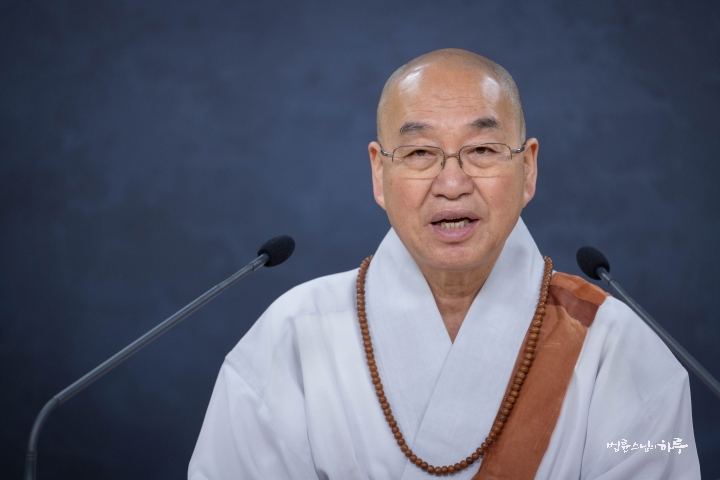Nov 2, 2024 – Jungto Sutra Course Dharma Q&A
Hello. Morning has dawned at the Dubuk Jungto Retreat Center.
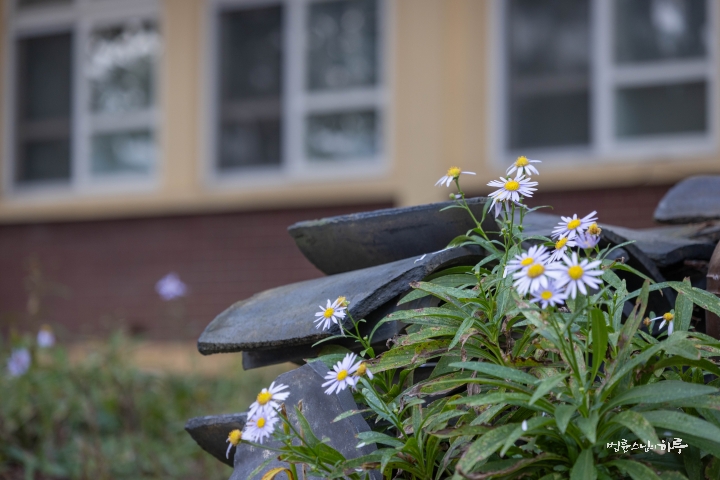
After completing his early morning practice and meditation, Sunim held a Dharma Q&A session with students attending the Jungto Sutra Course class from 10 AM. The session began with about 1,200 students connected online, waving their hands to greet each other.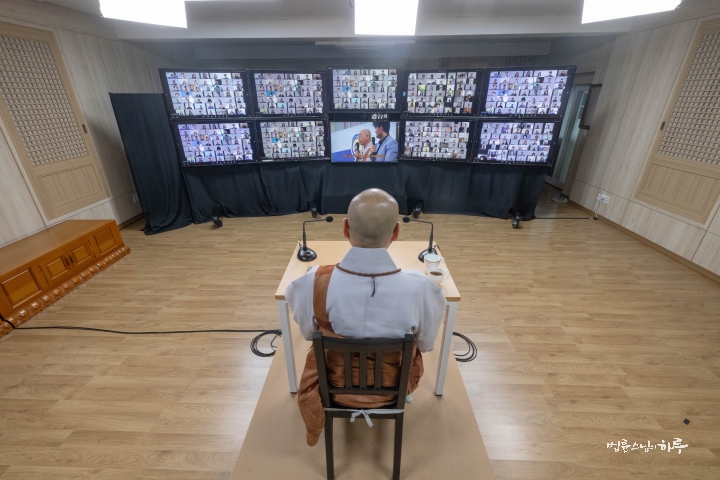
First, they watched a video showing the practical activities of the Sutra Course students over the past month. Then, everyone bowed three times to Sunim, requesting his Dharma teaching. Sunim began with a greeting.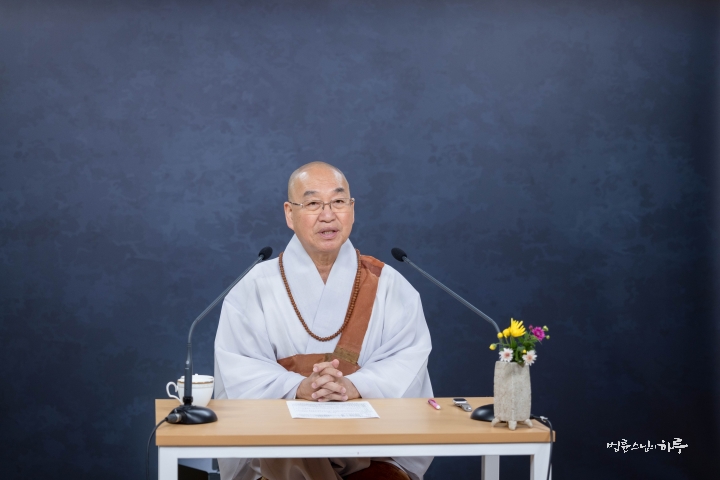
“How are your studies going? This seems to be the first time we’re meeting since your enrollment. Before we start our conversation, let’s watch a video. Do you remember the major earthquake in Türkiye and Syria in early February last year? A school with 4,000 students collapsed, and JTS, in collaboration with the local organization White Helmets, rebuilt the school and held an opening ceremony within a year.”
Next, they watched a video showing Sunim attending the opening ceremony of the newly built school in the earthquake-affected border region of Türkiye and Syria last month.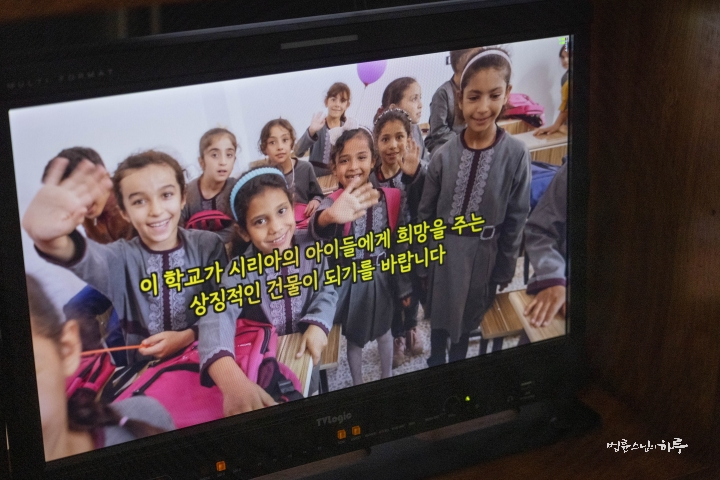
Many people wiped their tears with handkerchiefs while watching the video.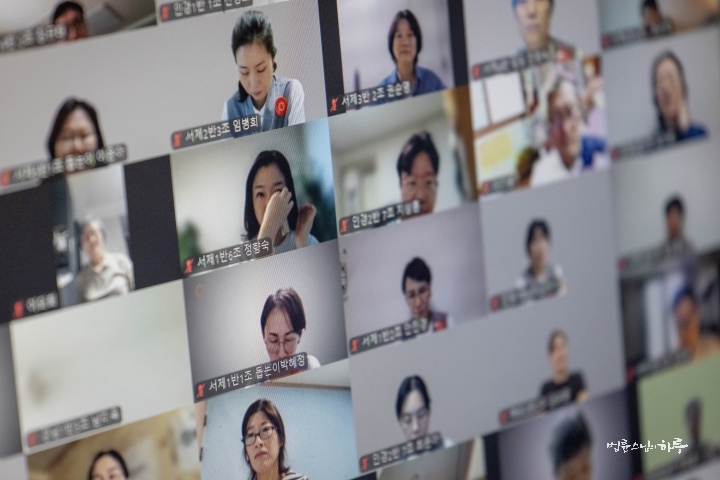
“Did you watch it well? It’s miraculous that such a large school for 4,000 students was built in just a year, thanks to the efforts of many people. While JTS provided significant support, it was possible because of the dedicated volunteers working for their country in Syria. However, this school will only benefit about 4,000 students. In this region, there are about 1.5 million children, but less than half of them can go to school. Originally, about 2 million people lived in this area, and now there are about 3.5 million refugees. As a result, children living in refugee camps have no access to schools at all.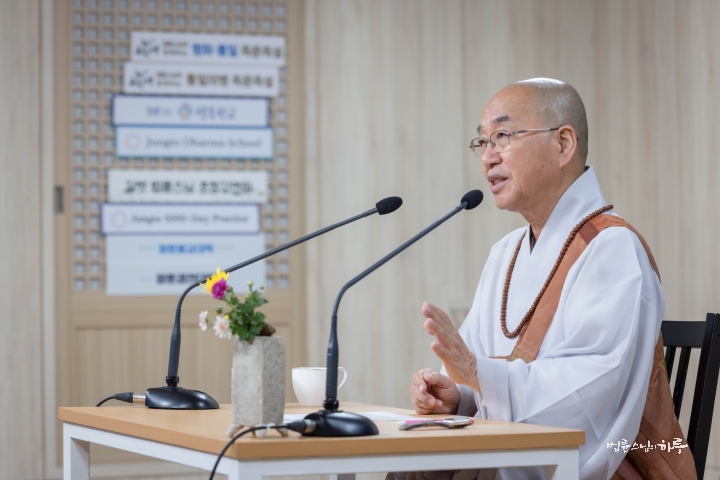
They Are All Our Children
Moreover, most of the existing schools were destroyed by the earthquake. Completely destroyed ones need to be rebuilt, partially damaged ones need repairs, and where there are no schools, we need to set up tents to combat illiteracy. However, due to the war over the past 10 years, the education system has collapsed, and most children have been left without educational opportunities. Even if they are not children from our country, we need to find solutions together with the perspective that ‘they are all our children.’
JTS operates on the principle that hungry people must eat, sick people must receive treatment, and children must learn at the right time. Regardless of religion, ideology, ethnicity, or nationality, everyone born as a human being has the right to receive such benefits, and we have an obligation to support them. This is also mentioned in the scriptures. When Buddha was about to enter nirvana, Ananda expressed concern, saying, ‘We have gained great merit by making offerings to the Buddha, but without the Buddha, won’t we lose the opportunity to gain such great merit?’ Buddha replied:
‘Ananda, do not worry. Even in a world without the Tathagata, there are four ways to gain merit equal to making offerings to the Buddha. First, giving food to the hungry to satisfy them. Second, providing medicine to the sick for treatment. Third, helping the poor and comforting the lonely. Fourth, supporting pure practitioners in their practice.’
Among these four, except for supporting pure practitioners, the remaining three are the founding principles of JTS. Those who are so poor that they cannot take care of their own children can be considered the poorest people in this world. That’s why JTS has modernized this expression to ‘All children must learn at the right time.’ This is how JTS established its founding principles in accordance with Buddha’s final teachings. Doing such work is equivalent to the merit of making offerings to the Buddha.
The Importance of Practice
So, instead of just thinking ‘I want to go to the Pure Land’ or ‘I want to go to heaven,’ it’s very important to actually practice in ways that can make that happen. Wishing to go to a good place without practicing is like trying to catch fish while climbing a tree. While learning theory and ideology is important, I want to emphasize that practicing even one small thing is very important.”
Next, questions were taken about points of curiosity that arose during the classes. The Sutra Course students have been studying the Diamond Sutra for two months since their enrollment in September. They freely asked questions about doubts that arose during the classes. One of them learned about ‘giving without expecting anything in return’ from the Diamond Sutra but felt resentful thinking she was the only one sacrificing in her relationship with her husband, and sought Sunim’s advice.
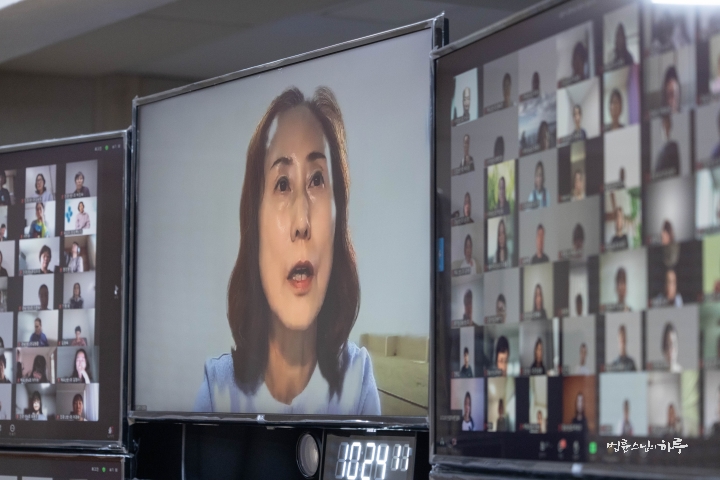
I’m Resentful, Feeling I’m the Only One Sacrificing in My Marriage
“If it’s difficult to practice, why are you trying to force yourself to do it? If it’s hard to practice, you can just not do it. When someone asks me how to control their anger, I say ‘Just get angry.’ If they then say ‘I feel miserable after getting angry,’ I tell them ‘Then don’t get angry.’
Let’s say there’s food here. When you say you want to eat it, if someone tells you, “It’s poisoned,” that should be the end of the question. Once you know it’s poisoned, your desire to eat it should immediately disappear. However, if you’re told it’s poisoned and you still say, “But I still want to eat it,” what more needs to be said? When someone says, “I still want to eat it,” I respond, “Then eat it and die.” If you’re told it’s poisoned, that should be the end of it. But since you insist on wanting to eat it, I say, “Then eat it and die.”
When you don’t know it’s poisoned, and you say, “I want to eat it,” I can tell you, “It’s poisoned.” But if I’ve told you it’s poisoned and you still say you want to eat it, all I can say is, “If you want to eat it that badly, then eat it and die.” That’s why when you first ask me something, I’d explain in detail. But if you hear that explanation and still ask, “Can’t I do it anyway?” I’d say, “Then go ahead and do it.”
Similarly, if you ask what to do when anger arises, I simply say, “Just be aware of it.” I only tell you, “Getting angry is like eating poisoned food.” Then, knowing it’s poisoned, you should be aware of it. But asking, “I’m still angry, what should I do?” is the same as saying, “But I still want to eat it.” Listen carefully to the conversations I have with you.
“I want to eat this food.”
“It’s poisoned.”
“But I still want to eat it.”
“Then eat it.”
“I don’t want to die.”
“Then don’t eat it.”
“But I still want to eat it.”
“Then eat it.”
“I don’t want to die.”
“Then don’t eat it.”
When I have this kind of conversation, you might think I don’t understand your feelings. But even if you want to eat it, if it’s poisoned, you shouldn’t eat it. If you still want to eat it, you must accept the consequence of death. This is the reality, so nothing more needs to be said. Because you say you want to eat it, I’m telling you that you’ll die if you do. And because you say you don’t want to die, I’m telling you not to eat it. I’m simply informing you. I’m busy enough living my own life—why would I want to interfere in someone else’s?
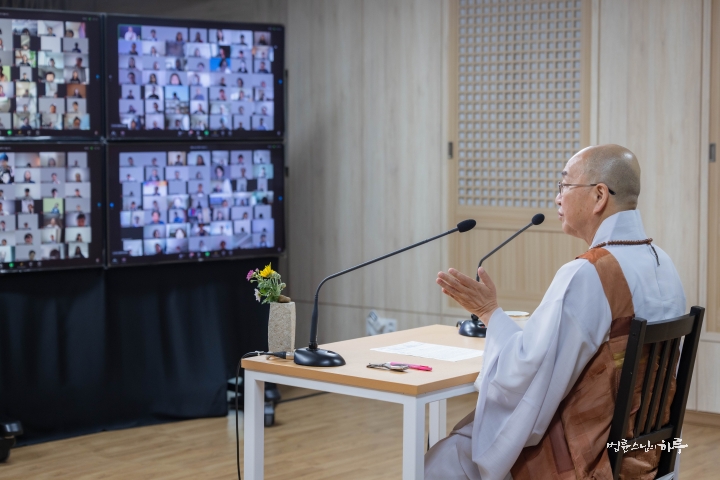
The fact that you’re feeling troubled now means you have expectations after doing something for your husband. It’s like thinking, “I wanted to see you, don’t you want to see me?”, “I love you, why don’t you love me back?”, or “I cooked for you, why don’t you say thank you?” You always have this expectation. We don’t do anything for strangers on the street, nor do we expect anything from them, but with family, we do a lot and expect a lot in return. The reason conflicts are intense in family relationships is because we expect compensation after doing something. This is like expecting profit after making an investment. Whether it’s investing materially and expecting praise in return, or investing with praise and expecting material compensation, we feel satisfied only when we receive something in return. Moreover, when receiving, we always want a little extra. However, in reality, compensation either doesn’t come at all, or it comes but not sufficiently, making us feel like we’re at a loss.
When someone is doing business and consistently incurs losses with a trading partner, they might think, “Should I cut ties?” However, if there aren’t any suitable alternatives, it becomes a dilemma. If there were other good options, they could simply switch, but when there aren’t any good alternatives, and continuing with the current partner results in losses, dissatisfaction builds up while the business relationship continues.
Your dissatisfaction with your husband is similar to this situation. If there were another man who could benefit you more, you might have already left your husband. But there isn’t necessarily a better alternative, or even if there is, there’s no guarantee that he would be more beneficial than your current husband. It would be ideal if your current “trading partner” (your husband) could guarantee profits, but he doesn’t, and there are no other options, That’s why you’re feeling conflicted right now. The core of this problem is that you have a mindset of seeking personal gain. That’s why you’re advised not to think about personal gain. If you continue to expect profits from a relationship that doesn’t guarantee them, your frustration will build up, eventually leading to a breakup. However, even if it feels like you’re at a loss right now, when you consider everything comprehensively, it can’t necessarily be called a loss. That’s why you’re advised not to focus too much on personal gain.
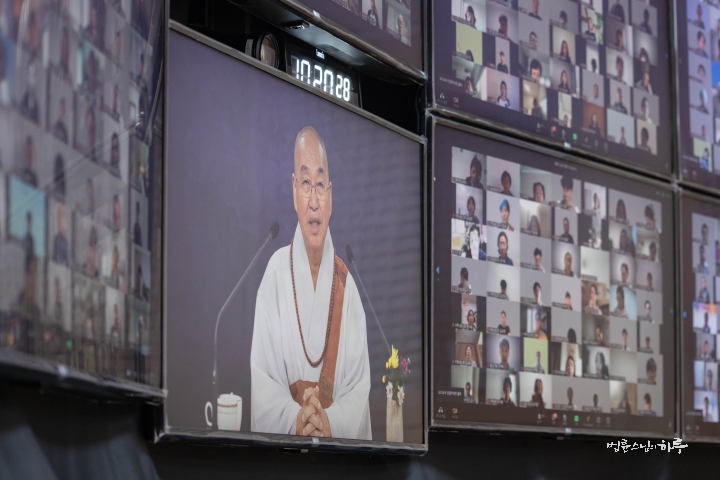
This is precisely what we call ‘giving without expecting anything in return’. This is the ideal state. However, even if you can’t achieve this level of giving, it’s less painful for you if you don’t focus too much on personal gain. A marital relationship isn’t a business transaction, yet when you constantly treat it as such, suffering arises. The love that many of you speak of is, upon closer inspection, entirely transactional. Demanding reciprocity by saying, “I did this, so you should do that,” is the same as asking, “I gave this much, how much will you give in return?” It’s the same perspective as conducting a business transaction. All conflicts arise from holding this transactional viewpoint. If you maintain this perspective, conflicts will continue to arise even as you live together. If you let go of this transactional viewpoint, conflicts will disappear.
I’m not saying that you must live by the principle of giving without expectation. It’s okay to decide to stop transacting with your husband. However, if you continue to engage in transactions, you should let go of the idea of seeking personal gain. Unless you’re planning to leave your husband, holding onto a transactional perspective while continuing to live together will only cause you suffering. If you can’t avoid transacting with your husband in your current situation, letting go of the idea of gaining from him will reduce your suffering.
What we call prostitution is essentially treating sex as a transaction. However, when two people become a married couple, they typically don’t treat sex as a transaction. There are many things that people usually transact but stop doing so when they become spouses. At the same time, many couples continue to transact in numerous ways even after marriage. In society, when sex is treated as a transaction, it’s called prostitution. When it’s not transactional, it’s called love. And when it occurs without consent or when payment isn’t made properly in a transactional relationship, it’s called sexual harassment. To be free from suffering, one should move from the level of prostitution towards love. Making someone work without pay is a master-slave relationship. Making someone work and paying them is an employer-employee relationship. Thus, labor is still transactional. Volunteering, where one works without expecting payment, is like love. Love in human relationships, like love between a man and a woman, is about not transacting. It’s about helping others because they need it, or giving a glass of water because they’re thirsty. In a loving relationship, you don’t say, “If I do this for you, how much will you give me?
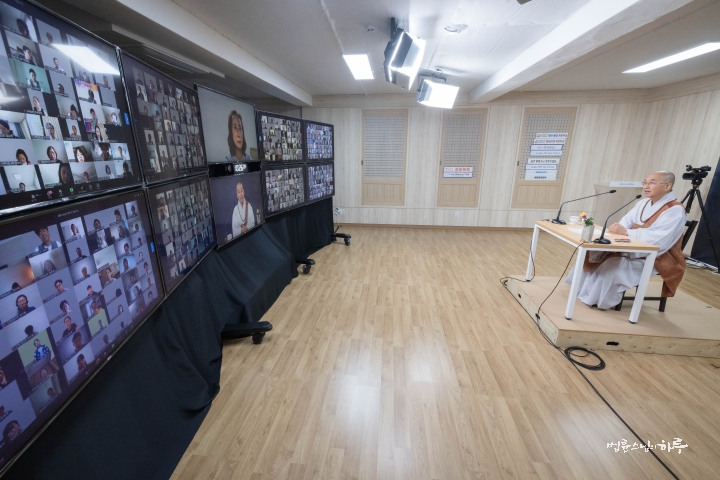
While it may be impossible to live without commercial transactions in a capitalist society, the idea is to foster loving human relationships within Jungto Society. This is why Jungto Society prohibits commercial transactions among its members and operates solely on volunteers. This operational policy differs significantly from the capitalist society where commercial transactions are the norm.
When parents raise young children, they don’t view it from a commercial perspective. However, as children grow older, a subtle commercial viewpoint often emerges. Saying things like, “I’ve sacrificed so much to raise you, yet you don’t understand my feelings,” reflects a commercial mindset. Most human relationships are indeed commercial in nature. However, to attain liberation, one must transcend this commercial perspective. Commercial transactions always involve gains and losses, making it difficult to escape from emotions of joy, anger, sorrow, and pleasure. When we suffer a loss, we feel distressed; when we gain, we feel joy. This cycle of emotions perpetuates the cycle of rebirth. To break free from this cycle, we must cease commercial transactions. By not focusing on gains and losses, we can liberate ourselves from the cycle of rebirth and live freely.
I’m not saying that all commercial transactions should be avoided unconditionally. Rather, I’m suggesting that those who seek freedom from suffering as practitioners should refrain from commercial transactions. The goal of a practitioner is not to make a profit, but to escape the anguish of the cycle of rebirth. To achieve this, one must transcend the commercial perspective. This is where the concept of “giving without expecting anything in return” comes from. It means doing something without expecting anything in return. The key is not just to do something anonymously, but to do it without any expectation. Just as we don’t expect anything from our face after washing it with our own hands, we should treat others’ needs as our own without expectation.
It’s not problematic if you can’t practice giving without expectation; it simply means you’re an ordinary person. Everyone lives engaging in commercial transactions. So if you, the questioner, live by engaging in commercial transactions, you’re just a normal person. However, if your goal as a practitioner is liberation, you must stop commercial transactions. To become a person free from suffering and truly liberated, you must transcend the commercial perspective.
Of course, it’s difficult to avoid commercial transactions because we’ve been accustomed to them since birth. In fact, Jungto Society faces many challenges in maintaining its principle of operating solely on volunteers. We’ve established our relationships not as commercial ones, but as loving ones, which is why Jungto Society operates entirely on volunteers. However, this presents many difficulties in reality. Nevertheless, thanks to many volunteers like you, Jungto Society has been able to come this far. As Jungto Society grows, there will be an increasing need for experts in various fields. However, experts tend to have a very strong commercial mindset. While non-experts find it relatively easier to volunteer, experts who are accustomed to commercial transactions find it challenging to volunteer. Those with doctoral degrees or specialized skills are used to receiving high compensation for their work in society, making it very difficult for them to work as volunteers.
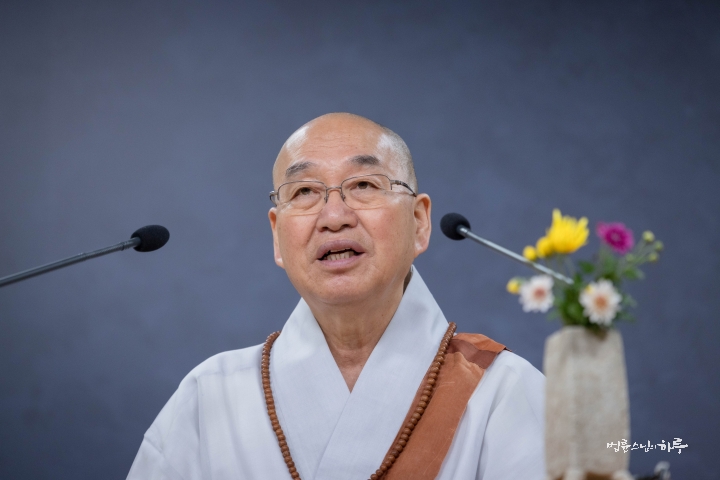
When an organization is small, there isn’t much need for specialized areas. However, as it grows, the need for specialized fields increases. Broadcasting and video editing are specialized areas, and some people suggest that we could generate more revenue from YouTube to cover the cost of hiring professionals. However, if we do that, Jungto Society would no longer be a practice community but would become a company. While hiring people to run operations might be very efficient, we would lose our core identity as a practice community, which is the essence of Jungto Society.
Similarly, are you going to run a small family business or a community of love? You’ve already started a partnership as a couple. It seems you’re harboring resentment towards your business partner, thinking, ‘I’ve done a lot of work, but you’ve done little.’ You need to decide now: either dissolve the partnership or transform your family business into a community of love.”
“Yes, I understand. I will reflect on what it means to be a practitioner.”
“Everyone has the same thoughts like yours. That’s why we don’t say that everyone should practice giving without expecting anything in return. However, if your goal is liberation from suffering, you need to move away from a transactional perspective.”
“Yes, I understand. Thank you.”
The questions continued.
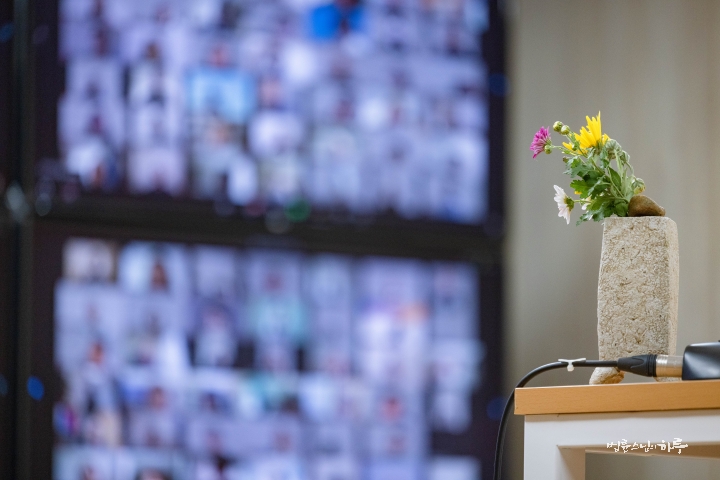
I learned about the law of dependent origination in your Diamond Sutra lecture. Are random acts of violence or sudden car accidents that claim innocent lives also due to karmic connections? My family experienced such an incident, and I find it difficult to understand or accept.
I don’t fully understand the teaching that to lighten our own burden, we must lighten the burden of all others.
I thought I should have some principles to steady myself when life becomes turbulent, but you say we shouldn’t even construct contemplation of the Dharma. Does this mean we shouldn’t hold any principles or beliefs in life?
How should we act after recognizing anger? I can feel that I’m angry, but the emotion doesn’t easily disappear.
When I explained to my family that morning practice is for my sake, they called it selfish. I’m wondering if it’s okay to add wishes for my family during practice.
After answering all the students’ questions, the promised two hours quickly passed.
“If anyone has any realizations or feelings from our conversation today, please share them.”
After the conversation, Sunim asked the students for their thoughts. Two students pressed the raise hand button and shared their impressions.
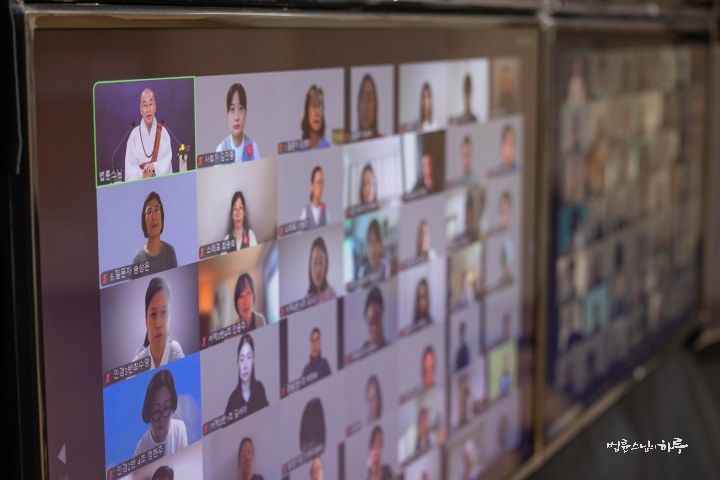
“There’s a phrase in the Diamond Sutra that says, ‘The Dharma is not Dharma, nor is it not Dharma.’ When I first saw the phrase ‘non-Dharma non-non-Dharma,’ I thought it was strange, like some kind of rap. But as I read it over and over, I began to vaguely understand its meaning. Today, when you explained it with simple examples, I clearly understood its meaning. It was a very informative and interesting time.”
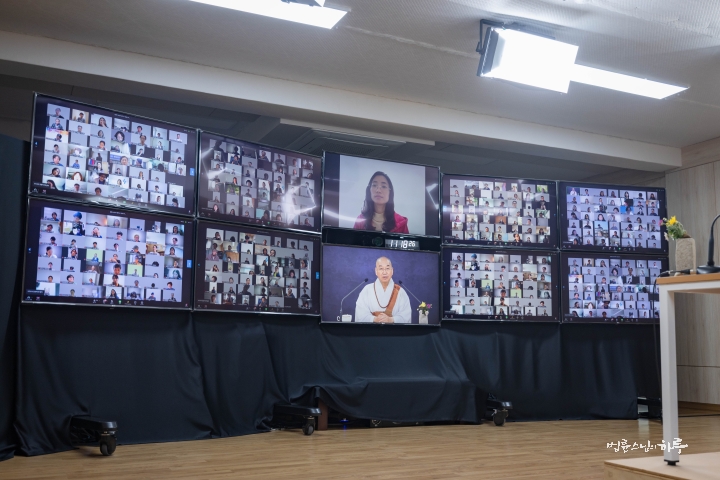
“I was deeply moved and shed tears watching the video about the school you built for Syrian refugees. I strongly felt that you’re doing remarkable work. It made me spontaneously send a donation. I’m not boasting, but I realized why we should donate to JTS.”
After hearing their impressions, Sunim gave some closing remarks.
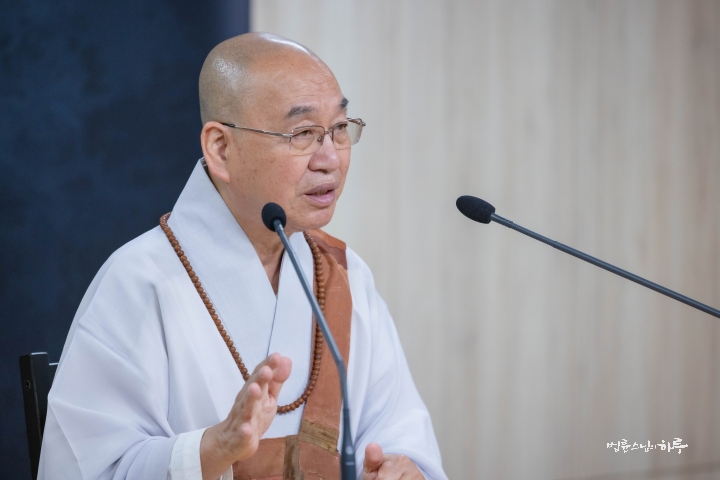
“Studying the Diamond Sutra is not just about understanding and acquiring knowledge of Buddhist scriptures, but fundamentally it’s about practicing mind training to free ourselves from all kinds of life’s sufferings. However, because the sutras are written in classical Chinese and use many old expressions, it’s difficult to properly understand their meaning.
Truth Is Not in Words, But in Our Lives
It seems that in the past, truth had to sound a bit difficult to be perceived as truth. But when I explain it in everyday language, you might now feel it lacks value. However, truth is not in words, but in our lives. Therefore, you should approach it with the perspective of ‘how to apply the Diamond Sutra to my life.’ If you don’t understand after hearing it once, listen to it repeatedly two or three times, and try to practice the content of the Diamond Sutra in your daily life along with the facilitator. I hope the teachings of the Diamond Sutra will be good material for making your lives more free and happy.”
We agreed to have another Dharma Q&A session next month and ended the live broadcast almost before 12 o’clock.
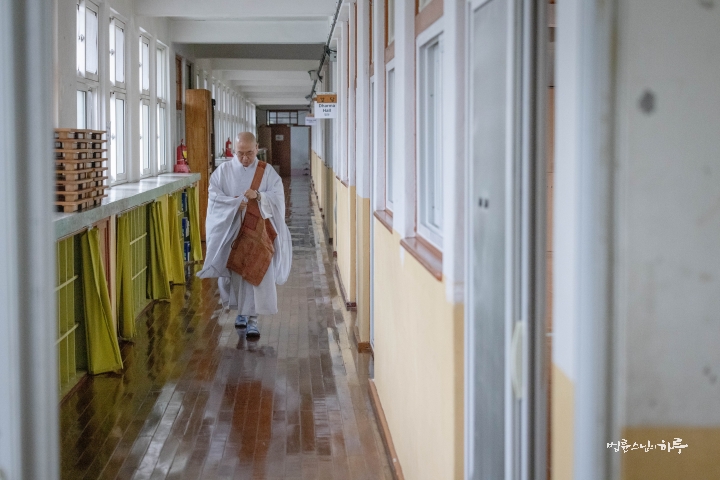
While the students had a time to share their thoughts in their class, Sunim left the broadcasting room and spent the entire afternoon working indoors.
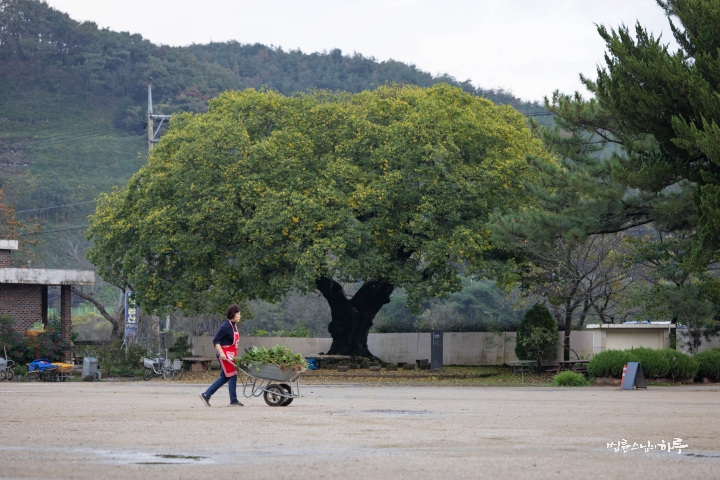
Sunim handled various tasks that couldn’t be addressed while abroad and made plans for several JTS projects, including a literacy campaign for Syrian citizens, sustainable development in Bhutan, and solving water shortage problems in East Timor.
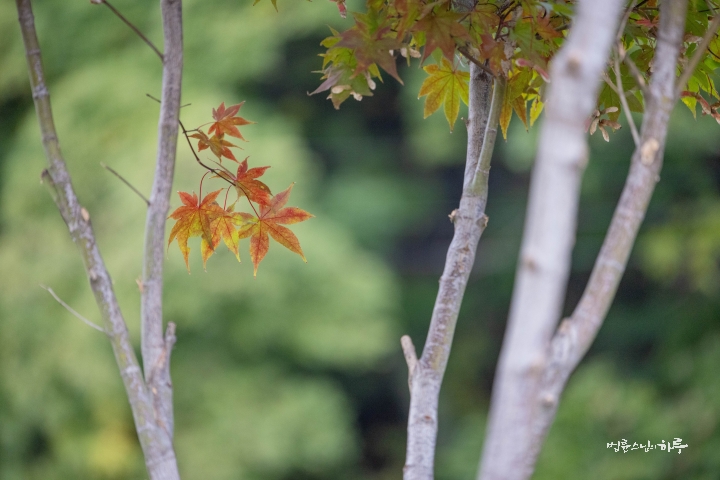
In the evening, as it was the anniversary of his father’s passing, Sunim performed a memorial service with his siblings, had a conversation with them, and ended the day’s schedule late at night.
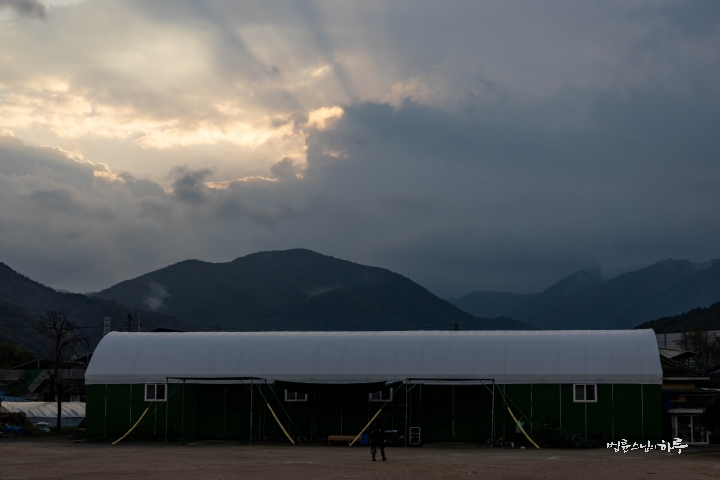
Tomorrow, Sunim is scheduled to have a Dharma Q&A meeting for alumni who used to work for the Buddhist Student Association in Gyeongju, and to have a conversation with female participants of the INEB Jungto Society study tour.


